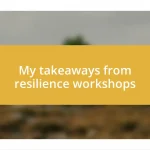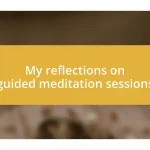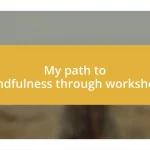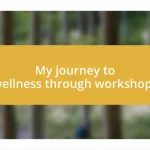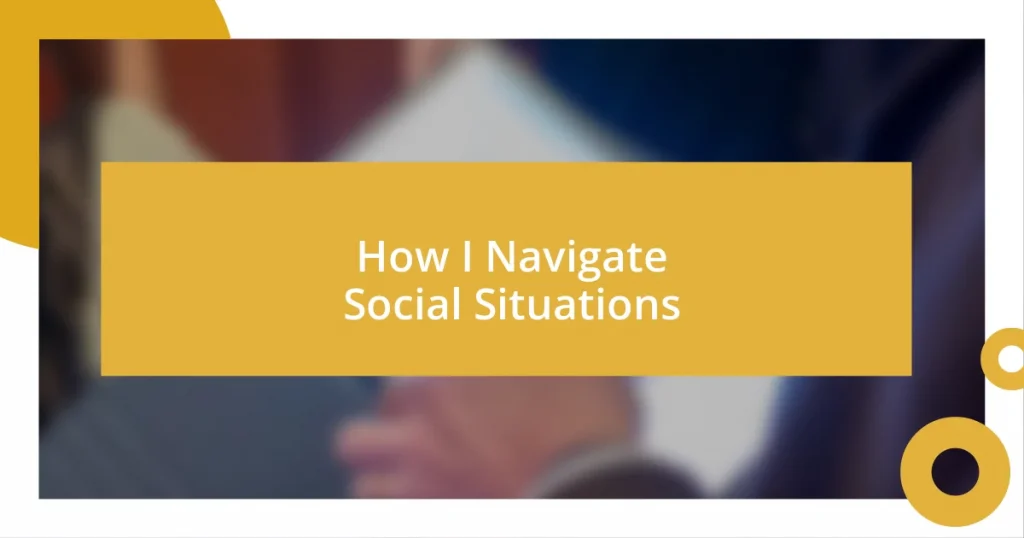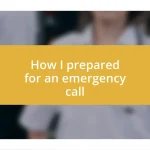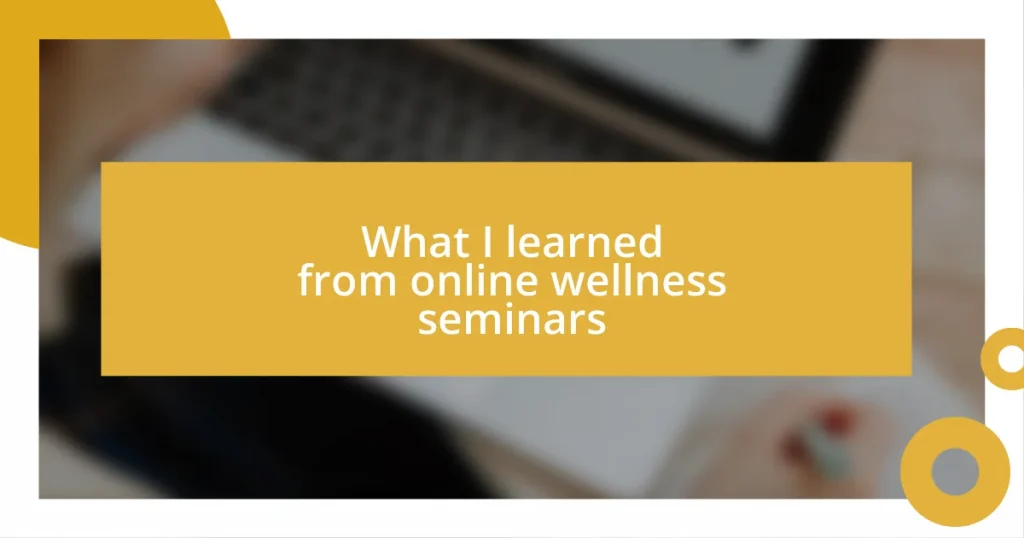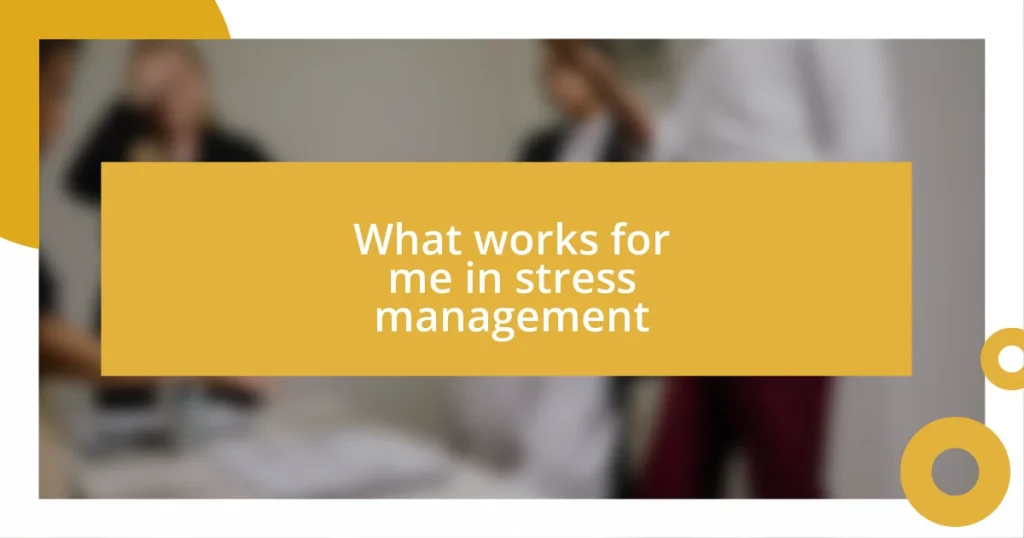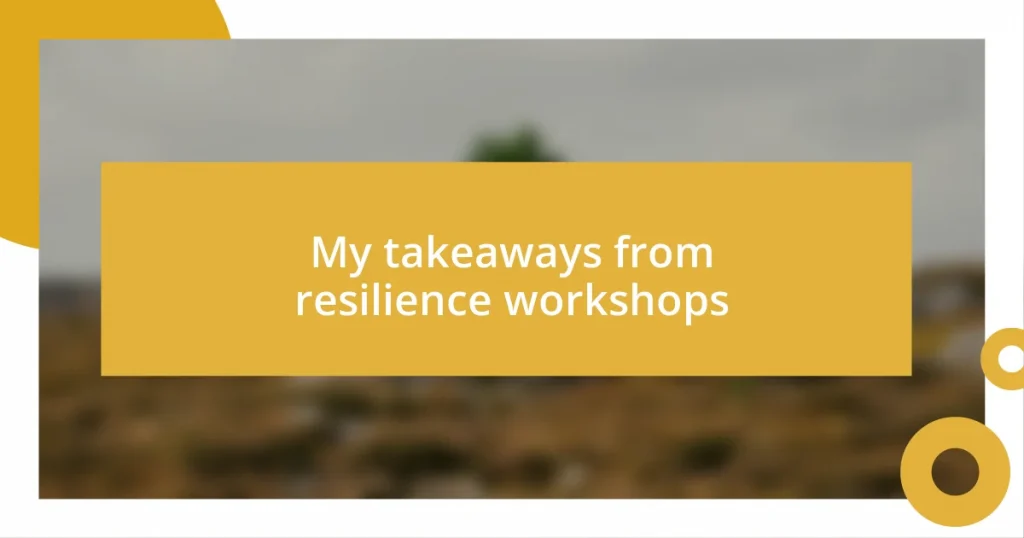Key takeaways:
- Social anxiety can manifest in various ways, often leading to overcompensation, such as excessive talking, rather than genuine connection.
- Identifying specific social triggers, such as environments and conversation topics, helps in preparing for and managing anxiety in social situations.
- Effective communication techniques, like active listening and open-ended questions, along with building confidence through body language and vulnerability, enhance social interactions.

Understanding Social Anxiety
Social anxiety can feel like carrying an invisible weight, one that affects how we engage with the world around us. I remember standing at the edge of a gathering, heart racing and palms sweating, questioning every possible interaction. Have you ever felt like everyone’s eyes are on you, amplifying the tiniest of fears into something overwhelmingly paralyzing?
It’s astonishing how quickly one’s thoughts spiral—wondering if you’ll say something silly or if your laughter will sound awkward. I often catch myself rehearsing conversations in my head, hoping to avoid that dreadful moment of silence. This constant mental dialogue can be exhausting, leaving little room for genuine connection and joy.
What surprises me is how social anxiety can manifest in ways we don’t initially recognize. For instance, while some might fidget or avoid eye contact, I often find myself overcompensating by talking too much. Do you feel like you’re putting on a performance instead of just being yourself? Embracing these feelings has led me to understand that many of us share a similar struggle, making it important to address and normalize these experiences.

Identifying Social Triggers
Identifying social triggers is crucial for navigating interactions effectively. I often notice that certain environments, like crowded parties or formal events, heighten my anxiety. Has anyone else felt a sudden sense of unease in similar situations? It’s fascinating to realize that what stresses me out might not even faze another person. Understanding these specific triggers allows me to prepare for them, sometimes opting for smaller gatherings where I feel more at ease.
It’s not just the surroundings that matter but also specific conversations or topics that can ignite my anxiety. For example, discussing current events can leave me feeling exposed and anxious if I’m unsure about my opinions. I’ve learned to steer clear of contentious subjects in casual settings. Do you have topics that you dread? By identifying these patterns, I can create a mental checklist to navigate my conversations more comfortably.
Another aspect I’ve observed is the impact of certain people on my emotional state. I’ve found that some friends uplift me, while others can inadvertently trigger anxiety with their intensity. Recognizing who sparks positivity and who doesn’t has helped me manage my emotional landscape more effectively. It makes me wonder—how much do the people around us shape our social experiences? By knowing who to surround myself with, I feel more empowered to approach social situations without fear.
| Social Triggers | Personal Reactions |
|---|---|
| Crowded environments | Increased anxiety |
| Contentious discussions | Avoidance or discomfort |
| Supportive friends | Increased confidence |
| Intense personalities | Heightened sensitivity |

Preparing for Social Interactions
Preparing for social interactions often starts long before stepping out the door. I find that creating a mental checklist helps me feel more grounded. For instance, I’ll think about what I might wear, which can make a huge difference in how confident I feel. The little things—like practicing a few conversation starters—can ease those nagging butterflies in my stomach.
Here are some steps I take to prepare:
- Choose Comfortable Attire: I pick outfits that not only look good but also make me feel at ease.
- Practice Relaxation Techniques: Simple breathing exercises work wonders to calm my nerves.
- Plan Topics of Conversation: I jot down a few safe subjects to discuss, just to keep the conversation flowing.
- Envision Positive Scenarios: I close my eyes and picture myself successfully chatting with others, boosting my confidence.
- Set Realistic Expectations: Reminding myself that it’s okay not to be perfect takes a lot of pressure off.
I’ve learned that preparation is a personal tool to help navigate through the unknown. It’s fascinating how these small actions create a shift in my mindset, enabling me to approach social events with a little more confidence.

Effective Communication Techniques
Effective communication is about more than just exchanging words; it’s about connecting with others. I’ve noticed that maintaining eye contact while speaking not only shows engagement but also builds trust. There have been times when I was in deep conversation, and locking eyes with someone made me feel more heard and understood. Have you experienced that connection during a chat?
Another technique I’ve learned is the power of active listening. Rather than just waiting for my turn to speak, I focus on truly hearing what others are saying. I remember a conversation where I practiced this—my friend felt genuinely valued, and it led to a deeper discussion. By responding thoughtfully to their points, I was able to create a more open dialogue. Isn’t it amazing how just listening can transform a conversation?
Lastly, using open-ended questions has been a game-changer for me. These questions invite more expansive responses, which helps keep the conversation flowing. Instead of asking if someone had a good weekend, I might ask what the highlight of their weekend was. This approach has often led to unexpected and meaningful exchanges. How often do you find yourself switching to a deeper topic just because you asked the right question? I’ve found that taking that extra step to engage often leads to richer connections than I initially expect.

Building Confidence in Conversations
Building confidence in conversations isn’t just about what we say; it’s also about how we feel. I recall a particularly nerve-wracking networking event where I decided to focus on my body language. Standing tall, shoulders back, and adopting an inviting posture made a noticeable difference. Suddenly, I felt more open to engaging with others. Isn’t it funny how a change in stance can shift our mindset so dramatically?
Another aspect I cherish is embracing vulnerability. I’ve found that when I share a little about my own experiences—perhaps a small mishap or a relatable story—I often see others open up as well. I remember one evening, sharing a silly moment from a recent trip. The laughter we shared broke the ice, and suddenly the conversation flowed effortlessly. Have you ever noticed how vulnerability creates a sense of camaraderie? It’s often in those moments that genuine connections are forged.
Lastly, I recommend focusing on the person you’re speaking with instead of your own insecurities. I remember attending a gathering and making a conscious effort to ask questions about other people’s interests. I found myself intrigued by their stories, which meant I wasn’t preoccupied with my own worries. In fact, I left that evening feeling energized rather than drained! Isn’t it incredible how shifting our focus can transform our experience in conversations?

Managing Unexpected Social Challenges
Unexpected social challenges can throw anyone off balance. I remember attending a wedding where a conversation took an awkward turn when someone brought up a sensitive topic. Instead of freezing, I took a deep breath and redirected the discussion to something lighter, like upcoming travel plans. It was such a relief to see the mood shift immediately. Have you ever had to navigate a similarly tricky situation?
In those moments of social tension, staying present is crucial for me. During one family gathering, a heated debate arose, causing discomfort around the table. I realized that remaining calm and using humor helped lighten the atmosphere. I cracked a joke about a quirky family memory, which not only eased the tension but also reminded everyone of our shared history. Isn’t it amazing how a little levity can change the energy in the room?
Equally important is my approach after the challenge has passed. I’ve learned the value of following up with those involved. After one awkward encounter at a book club, I reached out to the person I felt had been offended, expressing my concern and checking in on how they felt. That small gesture opened up a dialogue, clarifying misunderstandings and mending what could have become a rift. Have you ever found that a simple follow-up can make all the difference in reinforcing connections?

Reflecting on Social Experiences
Reflecting on social experiences often opens a treasure trove of insights. I recall a dinner party where I couldn’t shake off the feeling of insecurity, despite being surrounded by friendly faces. I spent time afterward replaying the evening in my mind, realizing that my nerves had kept me from fully engaging. Have you ever found yourself in a similar situation, wishing you had the chance to redo a moment?
After some reflection, I learned the importance of self-compassion. In those first few moments of social interaction, I often freeze, wondering if I said the right thing. Yet, one night, I decided to embrace my quirks instead, sharing my awkwardness openly. The hosts laughed along with me, and suddenly, the atmosphere shifted from tense to lighthearted. Isn’t it amazing how acceptance of our flaws can create bonds?
Furthermore, revisiting these experiences helps me recognize patterns. I’ve noticed that certain environments—like crowded parties—trigger my anxiety, while intimate gatherings leave me feeling uplifted. By identifying these tendencies, I can better prepare for future situations. Have you ever paid attention to how different settings affect your mood? Understanding my personal triggers has truly empowered me to navigate social situations with more clarity and confidence.


